- Faculty News
- Student News
- Lab News
- Publications
- Meetings and Presentations
- Outreach
- Grants
- Announcements
- About This Newsletter
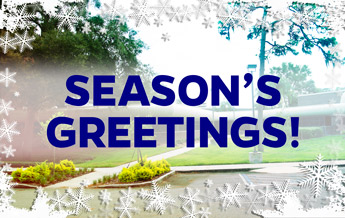
ABOVE: From everyone in the UF/IFAS Entomology & Nematology family, we hope you and yours have a very safe and happy winter break. See you in January!
A note from Dr. Siegfried
I am again amazed that another year has come and is nearly gone. Even harder to believe is that the new year starts a new decade! For us 2019 has been another year of changes and new faces in the department, including Dr. Sriyanka Lahiri at the Gulf Coast REC, and Dr. Anthony Auletta on campus in Gainesville. We have also interviewed candidates for three new positions. Dr. Phil Hahn and Dr. Estelle Martin will join our Gainesville faculty in January and interviews have been completed for the Biocontrol position at IRREC. We are also advertising for two positions at the Florida Medical Entomology Lab in Vero Beach so we are not yet finished! We have had a remarkable period of growth and opportunity and I know that this process has been exhausting, but we should be thankful for the opportunity to keep our department moving forward with new ideas and enthusiasm.
This year has also marked the retirement of Dr. Don Dickson who had been with our department for more than 50 years! His contributions are numerous and he has left a legacy of students and post-docs that trained in his lab and critical to future of nematology. I will miss his gentle chiding and sometimes not so gentle recommendations that have kept me on my toes.
2019 was also a year of loss when a long-time member of our department, Dr. Jim Maruniak, lost a long and difficult battle with cancer. We will miss the positive outlook and nurturing spirit that Jim brought to the department every day, even during the most difficult of times.
I was again gratified this year by the strong showing of our students in competitions at both ESA and SON 2019 meetings. I am continually impressed by the professionalism of our students and the quality of the science they present. This speaks not only to the quality of our students but to the quality of our faculty advisors. We are also NATIONAL CHAMPIONS for both the Linnaen Games as well as the Cobb Bowl that compete at the national meetings of ESA and SON quiz bowl type competitions. I know these teams don’t garner the same attention as our Gator athletic teams, but I am certain the UF athletic department would be envious of our number one status!
Our department completed a three-year administrative review in June of 2019 which resulted in many positive comments from senior IFAS administrators in all aspects of our department’s activities. We were recognized for our graduate program which remains one of the largest and most successful in the country. Our undergraduate and distance learning programs continue to show strong growth and our commitment to the development of innovative teaching programs was highlighted in their report. The report recognized a significant increase in research productivity and impactful Extension programs that are meeting the needs of clientele. Importantly, the report also acknowledged our staff for their professionalism and contributions to the success of our department. I was also pleased by the support of clientele invited to meet with the administrators. Overall, I believe IFAS administrators view us as being on the right track!
There will always be things that we can do better and it is important that we maintain our progress and continue to serve our students, clientele and conduct creative basic and applied research that advances our disciplines. I believe our Department is well position to continue its leadership and innovation and look forward to the coming decade to see where it leads us.
I hope everyone has a safe and restful holiday break and I look forward to seeing everyone in 2020.
Thank you for another great year,
~Dr. Blair Siegfried

Dr. Andrea Lucky was awarded an Early Career Teacher Award by the U.S. Department of Agriculture’s National Institute of Food and Agriculture (USDA-NIFA). She was one of two recipients, nationally, to be honored at the 2019 annual meeting of the Association of Public & Land-grant Universities (APLU) in San Diego, California.

The Mallinger Lab presented their work at ESA in St. Louis. Dr. Rachel Mallinger gave a talk on “Drought stress alters floral volatile emissions and reduces nectar rewards, pollinator visits, and seed set in a globally grown plant”, and Ph.D. student Sarah Anderson presented a poster “Changes in the phenology of the southeastern blueberry bee (Habropoda laboriosa) based on historic collections data” and an infographic “How are specialized plant-pollinator relationships affected by climate warming?”

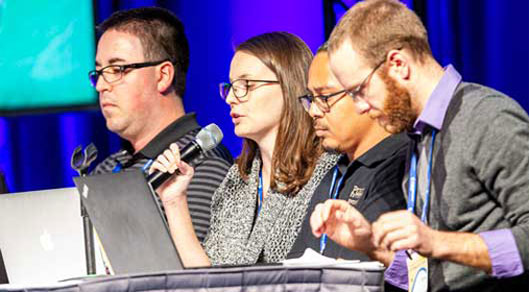
ABOVE: A team comprised of UF students won the ESA debate competition in St. Louis. The team led by Rachel Mallinger including UF Ph.D. students Sarah Anderson and John Ternest debated on the assigned prompt "Sustainable agriculture is the best approach to farming when incorporating IPM (pro/con)."

Dr. James P. Cuda was recognized by Dr. Nick Place, Dean for Extension, for his service as one of the top reviewers of EDIS factsheets during this past year.
Congratulations to our fall 2019 graduates!
Earning a Ph.D. this fall are: Dr. Gideon Alake (Dr. DiGennaro), Dr. Shiyao Jiang (Dr. Bloomquist), Dr. Rafia Khan (Dr. Seal), and Dr. Simon Yeboah (Dr. Liburd).
Graduating with an MS degree this fall are: Ingeborg Cuba (Dr. Bernier), Erin Foley (Dr. Gillett-Kaufman), Caitlyn Gill (Dr. Martini), Gabrielle LaTora (Dr. Liburd), Anne Mills (Dr. Beuzelin), Nicholas Overmire (Dr. Mathias), Edward Traczyk (Dr. Martini), Lincoln Wells (Dr. Mathias) Roxie White (Dr. Geden), and Daniela Wilner (Dr. Miller).
Our BS graduates are: Tanner Felbinger, Arron Hoyte, Constance Darrisaw, Gabriella Indart, and Ebony Taylor.

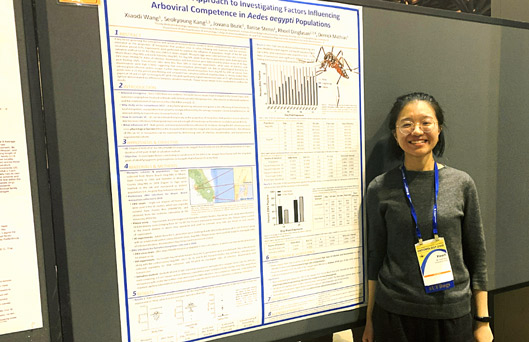
ABOVE: Congratulations to FMEL graduate student Xiaodi Wang for her second place award in the graduate student poster completion for Medical Urban and Veterinary Entomology at the Entomological Society of America Annual Meeting 2019.
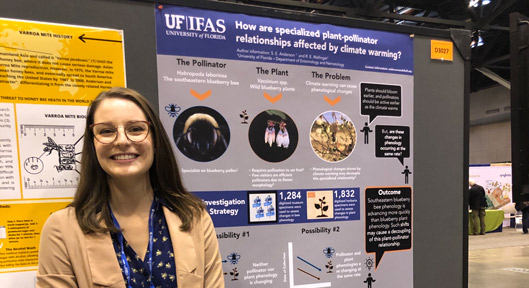
ABOVE: Sarah Anderson, Ph.D. student in the Mallinger Lab, received first place for her infographic at ESA “How are specialized plant-pollinator relationships affected by climate warming?”

Oliver Keller, a Ph.D. candidate in the Branham lab, was elected Program Chair for the Entomological Collections Network (ECN). The ECN is an organization whose mission is to disseminate information about best practices in entomological natural history collections. Their annual meeting always occurs the Saturday and Sunday before ESA.

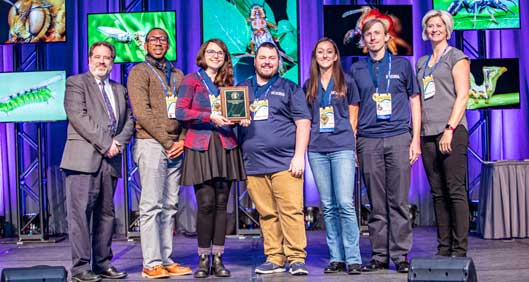
ABOVE: Our Linnaen team won first place of the Linnaen Games during the National Entomological Society of America conference held November 17th to the 20th.

Kristen Bowers, a Ph.D. student in Dr. Carey Minteer’s lab, received second place in the Entomological Society of America’s Graduate Speaking Competition at the 2019 Entomological Society of America’s Annual Meeting in St. Louis held November 17th to the 20th. Her talk was titled “Evaluating the impact of two herbivores on the invasive Brazilian peppertree, Schinus terebinthifolia.”
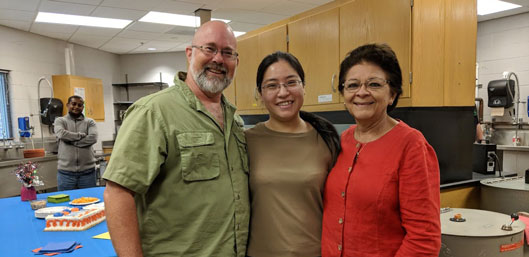
ABOVE: Dr. Mengyi (Tina) Gu, a recent Ph.D. graduate from the Crow Lab (2019), has accepted a Post-Doc position with Dr. Johan Desaeger at the Gulf Coast Research and Education Center.
The University of Florida’s 35th School of Structural Fumigation was held at the Ft. Lauderdale R.E.C. during November 18th to the 22th. The semiannual "Fume School" provides classroom, laboratory, and field training for pest control professionals who wish to supervise or conduct fumigations of buildings and goods against various pest infestations. Since its inception, the Fume School has been attended by 1,496 students. This remains the only school of its kind in the world. This latest class included 59 students from Florida, Texas, Indiana, Virginia, New Hampshire, Louisiana, California, North Carolina, Hawaii, Colorado, Mexico, Australia, The Bahamas, and Granada. The school prepared students who opted to take the Florida State certification exams in fumigation. Dr. Thomas Chouvenc, Dr. Rudi Scheffrahn, Dr. Bill Kern, and Renny Perez coordinated the school which brings expert instruction from manufacturers (Bayer, Douglas, Ensystex), suppliers (Cardinal, Univar), fumigators (Dead Bug Edwards, Central Fumigation and Emory Brantley & Sons), regulators (FLDACS), FL Dept. of Transportation, USDA, and Certified Pest Control Operators of Florida.

ABOVE: The University of Florida’s 35th School of Structural Fumigation.

Need to name that bug? A host of experts are available to help Floridians identify any insect or related arthropod. If a mystery creature has six or more legs, the UF Insect ID Lab is the place to call.
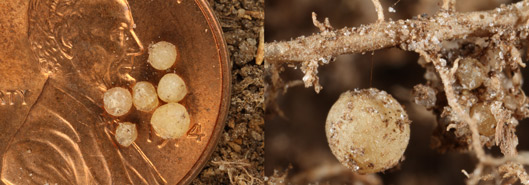
ABOVE: Ground pearls are an interesting group of scale insects in the family Margarodidae. They live in the soil and feed on roots. The life stage most commonly seen is the cyst stage, which has no legs or antennae. It is a feeding stage, and you can see the threadlike mouthparts in the 2nd image. They are often pests of turf grasses in the western portion of the Florida Panhandle.
Need insect images? You can go to this direct link, pictures are copyrighted material and intended for official UF use only, log onto the website using your Gatorlink credentials.
Lyle Buss is the Insect ID Lab manager.

For more information on the Nematode Assay Laboratory, please contact the lab manager Dr. Billy Crow.
Alto BW, Ortiz S, Wiggins K, Lord CC, Burkett-Cadena ND. 2019. Field assessment of autodissemination of insect growth regulators by mosquitoes in Florida. Journal of the Florida Mosquito Control Association 66: 27-39.
Bosak A, Saraf N, Willenberg A, Kwan M, Alto BW, Jackson B, Batchelor R, Nguyen T, Parks G, Seal S, Willenberg BJ. 2019. Aptamer-gold nanoparticle conjugates for the colorimetric detection of arboviruses and vector mosquito species. Royal Society of Chemistry Advances 9: 23752.
Dainese, M., Martin, E.A., Aizen, M.A. [and 99 others including R.E. Mallinger]. 2019. A global synthesis reveals biodiversity-mediated benefits for crop production. Science Advances 5:1-14.
Ferreira VS, Keller O, Branham MA, Ivie MA. 2019. Molecular data support the placement of the enigmatic Cheguevaria as a subfamily of Lampyridae (Insecta: Coleoptera). Zoological Journal of the Linnean Society: 187(4): 12531258. https://doi.org/10.1093/zoolinnean/zlz073
Habteweld AW, Akazi F, Joseph S, Crow WT, Abebe E, Mekete T. 2019. Description of Hirshmanniella dicksoni n. sp. (Nematoda: Pratylenchidae) from rhizosphere soil of limpograss from Florida, USA. Journal of Nematology 51:e2019-83. doi/10.21307/jofnem-2019-083.
Paige A, Bellamy, S, Alto, BW, Dean, C, Yee, D. 2019. Larval nutrient effects on infection and transmission potential of Zika virus in Aedes aegypti. Oecologia 191: 1-10.
Zhang YM, Vitone TR, Storer CG, Payton AC, Dunn RR, Hulcr J, McDaniel SF, Lucky A. 2019. From Pavement to Population Genomics: Characterizing a Long-Established Non-native Ant in North America Through Citizen Science and ddRADseq. Frontiers in Ecology & Evolution 7: 453. doi.org/10.3389/fevo.2019.00453.
Zhao L, Alto BW, Jiang Y, Yu F, Zhang Y. 2019. Transcriptomic analysis of Aedes aegypti innate immune system in response to ingestion of chikungunya virus. International Journal of Molecular Sciences 20: 3133.

New on Featured Creatures:
Do you have a favorite creature? Learn how to make it into a Featured Creature!Yellow Garden Spider, Argiope aurantia (Lucas). Authors: Tarym B. Griffith and Jennifer L. Gillett-Kaufman.
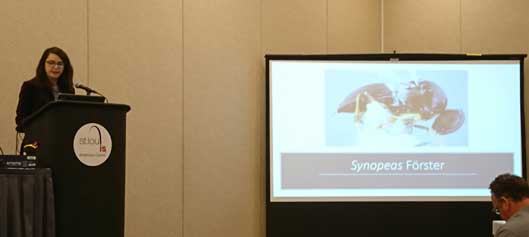
ABOVE: Jessica Awad’s presentation at ESA won first prize in the SysEB Taxonomy & Diversity student competition. The title was "Building a Diagnostic Framework for the Genus Synopeas Using Reared Specimens from Papua New Guinea.”
 Dr. Mallinger was an invited speaker at the 2019 Statewide Master Gardeners Conference on October 22. She gave a talk on Supporting Native Bees in Your Garden.
Dr. Mallinger was an invited speaker at the 2019 Statewide Master Gardeners Conference on October 22. She gave a talk on Supporting Native Bees in Your Garden.
 Oliver Keller, a Ph.D. candidate in the Branham lab, gave a presentation at the Entomological Collections Network annual meeting in St. Louis on November 17.
Oliver Keller, a Ph.D. candidate in the Branham lab, gave a presentation at the Entomological Collections Network annual meeting in St. Louis on November 17.

Dr. Jacqueline Miller attended the Entomological Collections Network and the Entomological Society meetings in St. Louis, MO. She also presented the following oral presentation: Miller JY, Matthews DL. Deception, thievery and mutualism in the orchid-insect world.

Dr. Ginny Greenway, a postdoctoral researcher in the Miller lab, gave an invited talk at the Smithsonian Tropical Research Institute in Panama. Her talk was titled “Beyond the dyad: Exploring mating and competition networks in insects” and was part of the Behavioral Discussion Seminar Series.
This December, Dr. Ginny Greenway travelled to London to give a poster presentation at the Association for the Study of Animal Behaviour Winter Meeting. She presented her research on why some individuals mate with the wrong species. Dr. Greenway is a postdoctoral researcher in Dr. Christine Miller’s lab.

Dr. James P. Cuda attended the annual meeting of the Entomological Society of America held in St. Louis, MO, November 17th to the 20th. Dr. Cuda presented a poster titled “Is the gall midge Orseolia javanica (Diptera: Cecidomyiidae) a potential biological control agent for the invasive cogongrass, Imperata cylindrica, in the southeastern US?”. Dr. Cuda also was a co-author on presentations by two of his former graduate students: Dr. Eutychus Kariuki and Ms. Patricia Prade.

Dr. Lawrence Reeves presented a talk titled "Phenacomyia: A new Culex subgenus detected in Florida through DNA barcoding" at the Florida Mosquito Control Association Annual Fall Meeting in St. Augustine, Florida
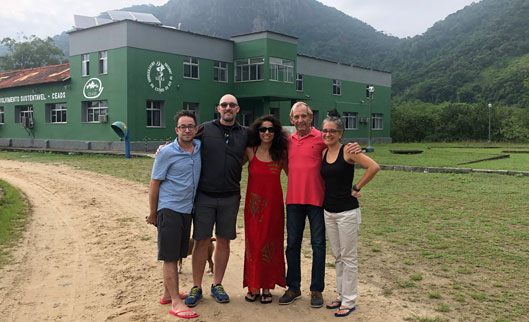
ABOVE: Dr. Jorge Rey, Dr. Barry Alto, Dr. Tanise Stenn, and Dr. Lawrence Reeves, with international collaborators, co-instructed the 2nd International Course on the Ecological Determinants of Vector-Borne Disease Dynamics at Ilha Grande, Rio de Janeiro, Brazil, from October 30th to November 8th 2019.

Jonhalyn Gordon and Joseph Velenovsky from the Chouvenc Lab both obtained first placed in their respective sessions of the graduate student competition at the Entomological Society of America annual meeting 2019 in St Louis.

Dr. Billy Crow presented “Nematode management on golf course turf” at the Carolinas Golf Course Superintendents Association conference at Myrtle Beach, SC on November 18th.
Dr. Billy Crow presented “How nematicides work” at the Missouri Green Industry conference at St. Charles MO on December 4th.

Kristin Dunn presented the talk "Micro-CT scanning: A 3D approach to visualizing the structure of light organs in fireflies (Coleoptera: Lampyridae)" in the graduate student competition at the annual ESA meeting in St. Louis, MO.

The Lucky Lab was well represented at the ESA annual meeting in St Louis.
Jason Williams presented an oral presentation: Global domination by crazy ants: Ultraconserved elements reveal biogeographic history and invasive species relationships in the genus Nylanderia (Hymenoptera, Formicidae).
Dr. Miles Zhang presented an oral presentation: Reinterpreting color patterns and species limits using UCEs: Phylogenomics of Sycophila (Hym: Eurytomidae) associated with oak galls.
Matt Miller (co-advised by Thomas Chouvenc) presented an oral presentation: Examining farming and tending behavior of Plagiolepis alluaudi (Formicidae) towards Paracoccus marginatus (Pseudococcidae).
Dr. Andrea Lucky presented an oral presentation: Collection-based education by distance and face to face: Learning outcomes and academic dishonesty.
From the Outreach Coordinator
Here are our events from November:
- November 1st to the 3rd: New Orelans Bug Fest!!!- Dr. Rebecca Baldwin, Dr. Koehler, Clayton Bania, Ebony Taylor, Remy Powell, Constance Darrisaw, Kathryn Naherny, and Tarolyn Plumley.
- November 6 to the 10th: OCALI days!!-Dr. Rebecca Baldwin, Cleveland Ivey, Constance Darrisaw, Rebecca Perry, Yuexun Tian, and Matt Borden.
- November 22nd- FFA Entomology Tour- Dr. Phil Koehler, Dr. Rebecca Baldwin.
The live critters are always a hit with children and adults alike. The critters are available for you to check out should you be leading an outreach event. We have doubles of our most popular critters, as well as various native insect species depending on the time of year. We have large wood and Plexiglas cages for viewing our native orb weaving spiders. There is one travel cage and one larger static cage. Please be sure to contact us and review the protocol on transporting and handling the critters if you are not already familiar with it. If you lead an outreach, be sure to fill out a documentation form so your event can be included in the newsletter and we can log all outreach events.
If you would like to schedule an event or have any outreach questions, go to the Outreach pages on our Bug Club website and contact us. If you have any questions, please email me.Thank you — Clayton Bania, Outreach Coordinator.
Shiyao Jiang, Ph.D. student with Dr. Jeff Bloomquist was awarded the Pauline O. Lawrence Scholarship in Insect Physiology, Toxicology, Biochemistry and Molecular Biology.
Sage Thompson was awarded the Nan Yao and Jill Su Scholarship for M.S. students.
Ana Paula de Carvalho was awarded the Nan Yao and Jill Su Scholarship for Ph.D. students.
Want grant writing tips? Check out the UF Libraries Grants Management Program!
Registration for the February UF Fume school 2020 is open. Register here.

Getting social!
We have several social media sites for the Entomology & Nematology Department. To make them easily searchable, all three (YouTube, Facebook and Twitter) have the same page name: UFEntomology. Please share these links with past students or colleagues who may have an interest in departmental activities.
Suzy Rodriguez is the newsletter editor and does the HTML coding. Issues usually are published by mid-month. Submit items for an issue by the 7th of that month.
We like to share news when it happens using our social media outlets: Twitter, Facebook and YouTube. Follow us on these sites for daily updates! When you send news, we will post it on one or more of these sites and again in the monthly newsletter. Please be sure you have permission from people in photographs you submit for publication.
UF-Bugnews-L listserv subscribers receive notices when issues are posted. Our home page has instructions for subscribing and unsubscribing.
Special thanks to Eleanor Phillips and Nancy Sanders who reviewed the newsletter for errors and to Jane Medley and Don Wasik who built the web page design.